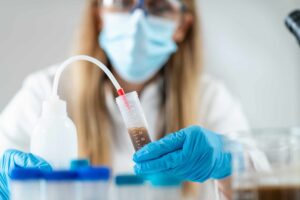What is already known
Disruptions of the crosstalk between the gut and the brain has been implicated in many conditions, including substance use disorders. Links between microbiota alterations and substance use disorders have been found in mice and people, and many drugs of abuse appear to have a detrimental effect on the composition and function of the gut microbiota. However, the effects of cocaine on gut microbes have remained elusive.
What this research adds
Researchers analyzed the microbial communities of 58 people with cocaine use disorder and 20 healthy controls. Compared with controls, cocaine users showed a decrease in microbial diversity and alterations in the composition of the mouth and gut microbiotas. They also had reduced levels of the short-chain fatty acid butyric acid, which were restored to normal amounts after transcranial magnetic stimulation, or rTMS, a noninvasive form of brain stimulation that induced cocaine abstinence.
Conclusions
Cocaine users have an altered gut and oral microbiota composition and function, which can be rescued by rTMS-induced cocaine abstinence.
Disruptions of the crosstalk between the gut and the brain has been implicated in many conditions, including substance use disorders. New research shows that cocaine users have an altered gut and oral microbiota composition and function, which can be rescued by cocaine abstinence induced through a noninvasive form of brain stimulation.
The findings, published in iScience, add to evidence that the microbiota plays an important role in neuropsychiatric conditions, including substance use disorders. “Our study demonstrates the profound oral and intestinal compositional and functional dysbiosis of [cocaine use disorder] patients,” the authors say.
Scientists have found links between microbiota alterations and substance use disorders in mice and people, and many drugs of abuse appear to have a detrimental effect on the composition and function of the gut microbiota. However, the effects of cocaine on gut microbes have remained elusive.
Researchers led by Amedeo Amedei at the University of Florence assessed the changes in the gut and oral microbes of people with cocaine use disorder. Then, they tested whether cocaine abstinence induced through brain stimulation could restore a healthy microbiota.
Altered microbiotas
The researchers enrolled 58 people with cocaine use disorder and 20 healthy controls. Compared with controls, people with cocaine use disorder showed a decrease in microbial diversity and alterations in the composition of the mouth and gut microbiotas.
Cocaine users had higher fecal levels of microbes such as Erysipelotrichaceae, Blautia and Streptococcus species, as well as lower abundances of bacteria including Desulfovibrionaceae, Alistipes and Bacteroides species than controls. On the other hand, they showed increased saliva levels of Rothia, Staphylococcus and Treponema species, and decreased abundances of Haemophilus, Neisseria and Porphyromonas compared with healthy individuals.
Cocaine users also showed a differential expression of several metabolic pathways as well as reduced levels of the short-chain fatty acid butyric acid. Butyric acids and other short-chain fatty acids are the main end-products of the microbial fermentation of dietary fibers and they have been shown to influence immune system function.
Brain stimulation
Next, the researchers set out to test the effects of transcranial magnetic stimulation, or rTMS, a procedure that uses magnetic fields to stimulate nerve cells in the brain. Previous research has shown that rTMS can reduce cocaine intake and craving in people with cocaine use disorder.
Eight weeks after rTMS treatment, the saliva of cocaine users had lower levels of bacteria including Lactobacillales, Lachnospiraceae and Prevotellaceae, and higher abundances of Oribacterium species. rTMS treatment also associated with an increase in the fecal abundance of butyric acid, the researchers found.
“We can speculate that rTMS-induced cocaine abstinence could play a role in the gut-brain axis and exert effects on microbial communities leading to [gut microbiota] and [oral microbiota] beneficial properties,” the authors say. “rTMS treatment inducing reduced cocaine consumption and craving may represent a promising avenue for future therapeutic development.”












